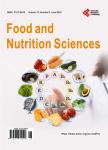Daily Intake of a Commercially Available Vegetable Juice Has Beneficial Effects on Metabolic Syndrome-Related Biomarkers in Young, Healthy Japanese Adults
Daily Intake of a Commercially Available Vegetable Juice Has Beneficial Effects on Metabolic Syndrome-Related Biomarkers in Young, Healthy Japanese Adults作者机构:Innovation Division KAGOME Co. Ltd. Tochigi Japan Institution for World Health Development Mukogawa Women’s University Hyogo Japan Hyogo Prefecture Health Promotion Association Hyogo Japan Faculty of Contemporary Human Life Science Department of Food and Nutrition Tezukayama University Nara Japan
出 版 物:《Food and Nutrition Sciences》 (食品与营养科学(英文))
年 卷 期:2016年第7卷第10期
页 面:844-854页
主 题:Vegetable Juice Carotenoid Potassium Metabolic Syndrome Urinary Sodium to Potassium Ratio
摘 要:Adequate vegetable intake is important in reducing the risk of lifestyle-related diseases;however, intake amongst young Japanese adults is poor. This study aimed to assess the effect of daily intake of a commercially available vegetable juice on nutritional status and metabolic syndrome-related markers in healthy young adults. Fifty-one healthy adults (14 men, 37 women), age 20 - 22 years were recruited, and their food and nutritional intake was surveyed using an FFQ based on Food Groups. Subjects were divided into either a control group, who were not administered vegetable juice, or an intervention group, who consumed 200 mL vegetable juice daily for 2 months. Anthropometric data, serum carotenoid concentrations, blood and urinary parameters were measured at baseline and at 2 months. The average intake of vegetables in all subjects at baseline was approximately 140 g/day, less than half the dose recommended by the Japanese government. Total serum carotenoid concentration in the intervention group doubled from baseline after 2 months. In particular, serum concentrations of α-carotene, β-carotene, and lycopene were increased. In the intervention group, 24-hour urinary potassium excretion increased significantly, and 24-hour urinary sodium to potassium ratio decreased significantly. Waist circumference and systolic blood pressure also decreased significantly. Daily intake of a commercial vegetable juice for 2 months improved nutritional status in young adults with inadequate vegetable intake, shown by improved serum carotenoid and urine potassium levels. In addition, intake of vegetable juice may be beneficial in reducing the risk of metabolic syndrome.



